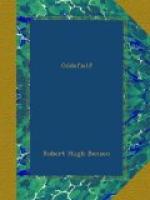By the time that we came to London Bridge the sun was yet lower, setting in a glory of crimson, so that it was hard to see against it much of Westminster, across the Southwark marshes and the river; but yet I could make out the roofs of the Abbey and of some of the great buildings of Whitehall, where my adventures, I thought, were to lie. But between that and the other end of London Bridge, just before we set foot on it, the rest of the City was plain enough; and, indeed, it was a splendid sight to see the river, all, as it seemed, of molten gold with the barges and the wherries plying upon it, and the great houses on the banks and their gardens coming down to the water-gates, and the forest of chimneys and roofs and steeples behind, and all of a translucent blue colour. The sounds of the City, too, came to us plainly across the water—the chiming of bells and the firing of some sunset gun, and even the noise of wheels and the barking of dogs and the crowing of cocks—all in a soft medley of human music that made my heart rejoice; for in spite of my long exile abroad and my French and Italianate manners, I counted myself always an Englishman.
Now the first design that I had in mind, and for which I had made my dispositions, was to go straight to my lodging that had been secured for me by my cousin Tom Jermyn, where he was to meet me, and where he too would lie that night. It was with him that I was to present my letters at Whitehall in a day or two, after I had bought my clothes and other necessaries; in short he was to be my cicerone for a while—for he was a Catholic too, like myself—but he was not to be told that I had come on any mission at all, until at anyrate I had well tested his discretion.
* * * * *
Now the mission on which I had been instructed by the Cardinal Secretary was in one sense a very light one, and in another a very difficult one; for its express duties were of the smallest.
Affairs in England at this time were in a very strange condition. First, the Duke of York, who was heir to the throne, was a declared Catholic; and then the King himself was next door to one, in heart at anyrate. Certainly he had never been reconciled to the Church, though the report among some was that he had been, during his life in Paris: but in heart, as I have said, he was one, and waited only for a favourable occasion to declare himself. For he had been so bold seventeen years before, as to send to Rome a scheme by which the Church of England was to be reunited to Rome under certain conditions, as that the mass, or parts of it, should be read in English, that the Protestant clergy who would submit to ordination should be allowed to keep their wives, and other matters of that kind. His answer from Rome, sent by word of mouth only, was that no scheme could be nearer to the heart of His Holiness; but that he must not be too precipitate. Let him first show that his




